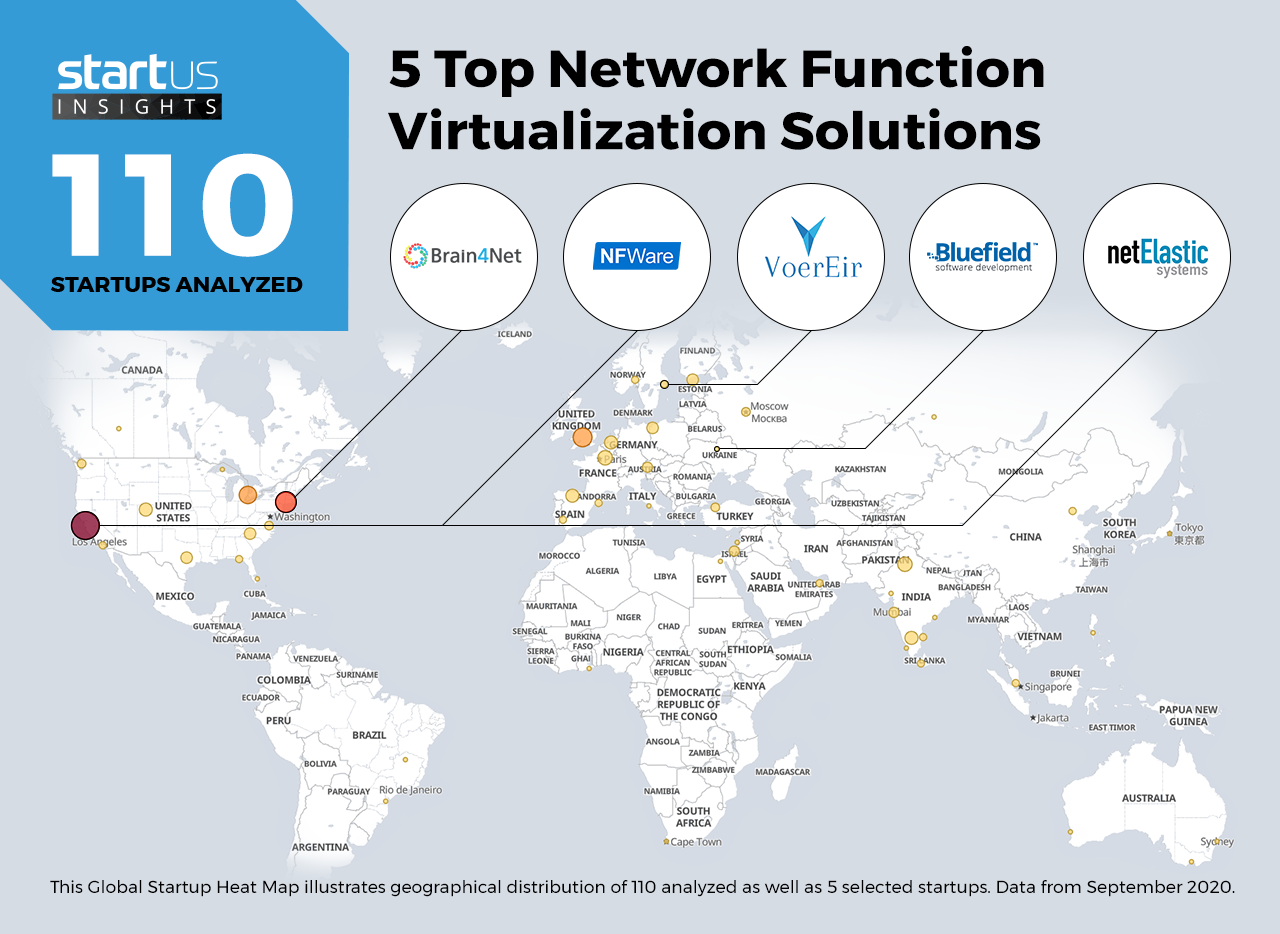Our Innovation Analysts recently looked into emerging technologies and up-and-coming startups working on innovative telecommunication solutions. As there is a large number of startups working on a wide variety of solutions, we decided to share our insights with you. This time, we are taking a look at 5 promising network function virtualization solutions.
Heat Map: 5 Top Network Function Virtualization Solutions
Using our StartUs Insights Discovery Platform, covering 1.379.000+ startups & scaleups globally, we looked at innovation in the field of telecom. For this research, we identified 110 relevant solutions and picked 5 to showcase below. These companies were chosen based on a data-driven startup scouting approach, taking into account factors such as location, founding year, and relevance of technology, among others. Depending on your specific criteria, the top picks might look entirely different.
The Global Startup Heat Map below highlights 5 startups & scaleups developing network function virtualization solutions. Moreover, the Heat Map reveals regions that observe a high startup activity and illustrates the geographic distribution of all 110 companies we analyzed for this specific topic.
NFWare – Virtual Internet Protocol (VIP) Routing
The benefits of virtual IP addresses include mobility, availability, and simplified name resolution. Unlike physical IP addresses, VIP addresses are not tethered to any particular machine. Virtual adapters bind VIP addresses and allow each cluster resource to have an individual entry in the routing tables. Startups aim to leverage the potential of virtual IP addresses and develop solutions for the telecom industry.
The US-based startup NFWare develops fast-virtualized IP routing solutions for network service providers, operators, and data centers. With the help of its proprietary virtualization technology and multi-core packet-processing algorithms, the startup enables the construction of high-performance network infrastructure. NFWare’s Virtual Carrier Grade NAT helps service providers to handle the IP-addresses shortage problem in a cost-effective manner. It works on standard servers yet has the performance to process terabits of traffic. Another solution, vLoad Balancer, is a software load balancer that significantly decreases network loads and prevents harmful distributed denial-of-service attacks (DDoS-attacks).
Brain4Net – Network-As-A-Platform
Telecommunications service providers utilize the network as a platform to distribute a wide range of services to customers reliably, efficiently, and securely. For this reason, networks are evolving to meet consumer demands for seamless network connectivity. Startups develop solutions that focus on network architecture and fault tolerance, as well as scalability and security, to improve telecom product offerings.
The US-based startup Brain4Net offers software-defined networking (SDN) and NFV solutions to communications service providers. The startup’s platform, B4N vCPE, is an end-to-end solution that manages carrier ethernet (CE) services with value-added virtual network services. The platform leverages both SDN and NFV technologies to enable clients to create agile and completely abstract platform-as-a-service (PaaS) networks for quick deployment.
VoerEir – NFV Infrastructure (NFVI) Benchmarking
The virtualization of standards of computing, storage, and network functions is also possible with simple off-the-shelf commercial hardware. Easy access to virtualization tools and techniques increases the scope for improvement, and benchmarking tools make the process easier. Startups develop benchmarking solutions to analyze NFVI and continuously evolve.
Swedish startup VoerEir develops Touchstone, a benchmarking tool for NFVI. With the help of its proprietary test engine, the startup enables clients to benchmark multiple cloud environments across a wide range of data centers. The tool analyzes the performance, functionality, robustness, and stability of the cloud environments and generates automated test cases and validation parameters.
Bluefield Technologies – Virtualized Network Functions (VNF)
The NFV architecture includes virtualized network functions (VNF) that are responsible for handling specific network functions. Some VNF also requires one or more virtual machines to run on top of the hardware networking infrastructure. Startups use NFV technologies to enable network splicing which plays a crucial role in the deployment of 5G.
Ukrainian startup Bluefield Technologies develops network technologies and prototype software. With the help of NFV technologies, the startup replaces hardware with software, embedded in the SDN, and further enables network functions to operate in the cloud. The startup uses a session border controller (SBC) to secure the network without having to install expensive hardware.
netElastic Systems – Virtual Routers
Physical networking devices such as routers forward data packets between networks, whereas virtual routers perform the same function without the need for hardware. Virtual routers provide telecom companies the ability to scale resources, for example, while adding cores. The lower costs also encourage startups to develop virtual router solutions and provide flexibility in efficiently moving routing functions within a network.
The US-based startup netElastic Systems produces virtual routers to perform network routing tasks, such as customer-premises equipment (CPE), Provider Edge (PE), and aggregation routing. vRouter is a scalable and cost-effective virtual router that delivers advanced routing capabilities at lower costs. The router supports open application programming interfaces (APIs) for integration and automation. It also provides separate control and data planes for flexible scaling and deployment options.
What About The Other 105 Solutions?
While we believe data is key to creating insights it can be easy to be overwhelmed by it. Our ambition is to create a comprehensive overview and provide actionable innovation intelligence and enable you to achieve your goals faster. The 5 network function virtualization solutions showcased above are promising examples out of 110 we analyzed for this article. To identify the most relevant solutions based on your specific criteria, get in touch.









